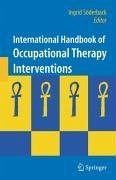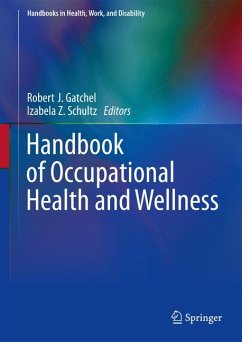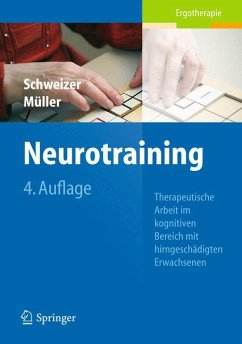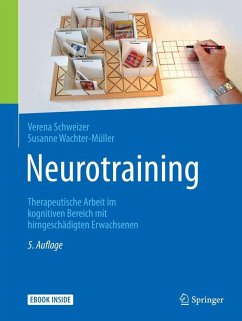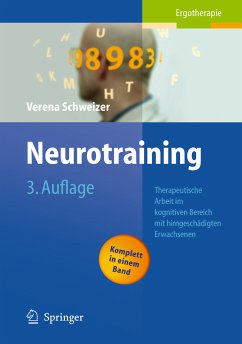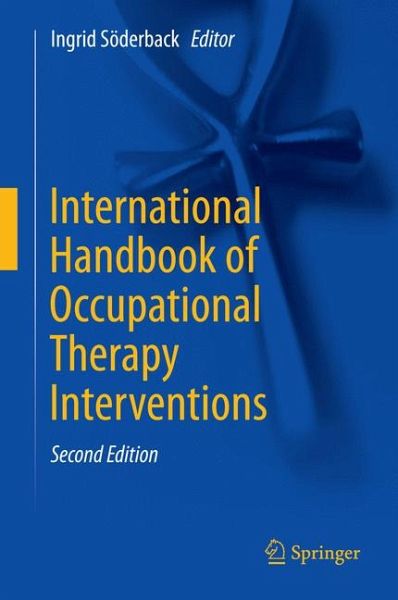
International Handbook of Occupational Therapy Interventions (eBook, PDF)
Versandkostenfrei!
Sofort per Download lieferbar
96,95 €
inkl. MwSt.
Weitere Ausgaben:

PAYBACK Punkte
48 °P sammeln!
Advanced therapies and technologies, new service delivery methods, and care upgrades in underserved areas are translating into improved quality of life for millions with disabilities. Occupational therapy parallels this progress at the individual level, balancing short-term recovery and adaptation with long-term independence and well-being.This Second Edition of the International Handbook of Occupational Therapy Interventions builds on its ground-breaking predecessor by modelling current clinical standards rooted in scientific evidence-based practice. Its interventions are applied to a diverse...
Advanced therapies and technologies, new service delivery methods, and care upgrades in underserved areas are translating into improved quality of life for millions with disabilities. Occupational therapy parallels this progress at the individual level, balancing short-term recovery and adaptation with long-term independence and well-being.
This Second Edition of the International Handbook of Occupational Therapy Interventions builds on its ground-breaking predecessor by modelling current clinical standards rooted in scientific evidence-based practice. Its interventions are applied to a diverse range of client disabilities, with many new or rewritten chapters on workplace and vehicle accommodations, smart home technologies, end-of-life planning, and other salient topics. New introductory chapters spotlight core competencies in the field, from assessing client needs and choosing appropriate interventions to evaluating programs and weighing priorities. And for increasededucational value, interactive case studies allow readers an extra avenue for honing clinical reasoning and decision-making skills. Of particular note is a new chapter providing a taxonomy-the Occupational Therapy Intervention Framework-and a validation study of its categories and concepts, delineating the occupational therapist's roles and the expected outcomes.
Intervention areas featured in the Handbook include:
¿ Adaptive interventions, OTs manage and facilitate clients' adaptations. ¿ Learning interventions, OTs teach and the clients learn or relearn. ¿ Enabling interventions, OTs enable clients to be meaningfully occupied. ¿ Preventing interventions, OTs prevent ill-health and promote clients' ability to sustain health in daily life.
The Second Edition of the International Handbook of Occupational Therapy Interventions is career-affirming reading for all members of rehabilitation teams, including occupational and physical therapists and rehabilitation nurses. Students intending to enter this growing field and professionals working toward its continued improvement will find it useful and inspiring.
This Second Edition of the International Handbook of Occupational Therapy Interventions builds on its ground-breaking predecessor by modelling current clinical standards rooted in scientific evidence-based practice. Its interventions are applied to a diverse range of client disabilities, with many new or rewritten chapters on workplace and vehicle accommodations, smart home technologies, end-of-life planning, and other salient topics. New introductory chapters spotlight core competencies in the field, from assessing client needs and choosing appropriate interventions to evaluating programs and weighing priorities. And for increasededucational value, interactive case studies allow readers an extra avenue for honing clinical reasoning and decision-making skills. Of particular note is a new chapter providing a taxonomy-the Occupational Therapy Intervention Framework-and a validation study of its categories and concepts, delineating the occupational therapist's roles and the expected outcomes.
Intervention areas featured in the Handbook include:
¿ Adaptive interventions, OTs manage and facilitate clients' adaptations. ¿ Learning interventions, OTs teach and the clients learn or relearn. ¿ Enabling interventions, OTs enable clients to be meaningfully occupied. ¿ Preventing interventions, OTs prevent ill-health and promote clients' ability to sustain health in daily life.
The Second Edition of the International Handbook of Occupational Therapy Interventions is career-affirming reading for all members of rehabilitation teams, including occupational and physical therapists and rehabilitation nurses. Students intending to enter this growing field and professionals working toward its continued improvement will find it useful and inspiring.
Dieser Download kann aus rechtlichen Gründen nur mit Rechnungsadresse in A, B, BG, CY, CZ, D, DK, EW, E, FIN, F, GR, HR, H, IRL, I, LT, L, LR, M, NL, PL, P, R, S, SLO, SK ausgeliefert werden.




